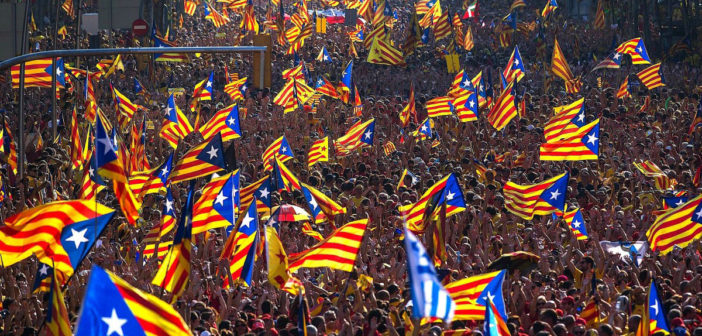[tribulant_slideshow gallery_id=”181″]
Nearly a month has passed since the semi-autonomous region of Catalonia held a referendum for independence from Spain and tensions only continue to rise. Brutal police crackdowns, including the merciless beating of protestors by Spanish police and the seizing of ballot boxes, ensued on Oct. 1 during an independence referendum vote. The people of Catalonia, especially the representative body of the region, have demanded unilateral independence from Spain. The Spanish government responded with threats to dissolve the semi-autonomous government of Catalonia, shut down the media of the region, and even conduct paramilitary operations to regain complete control, according to the BBC.
On Oct. 27th, the majority of Catalonia’s parliament voted for independence, with Catalonia’s president declaring the independence of the Catalan Republic. That same day, the Spanish central government invoked Article 155 of the Spanish constitution, stating that the central government has the right to dissolve the semi-autonomous status of Catalonia and assume direct control over the region.
Spain’s Prime Minister Mariano Rajoy also called for the president of Catalonia as well as those parliament members, who voted in favor of independence, to be charged with treason against the nation. Rajoy also called for a new election of the Catalan parliament, set to take place on the 21st of Dec. this year, according to the BBC.
Also, according to the BBC, Catalonia now constitutes 16 percent of the entire population of Spain, conducts and facilitates over a quarter of all Spanish exports, and produces goods equaling nearly 20 percent of the entire Spanish GDP. On the other hand, Catalonia’s tax payments to Madrid add up to one-fifth of all tax revenue collected by the central government despite only 14 percent of the public works budget going to the region. This is one key reason why many Catalonians seek independence; they feel cheated in an unfair deal with the Spanish government, paying more into the system than what they get back.
The economic wealth of the region is seen as a necessity to the recovering economy of Spain after the 2008 financial collapse, and thus it becomes obvious why the government based in Madrid will stop at nothing to retain control of Catalonia.
The Spanish government and other autonomous regions, such as Galicia, Navarre, and Valencia, also argue that all of Spain came together and wrote the 1978 constitution as a united whole and that Catalonia sparking a constitutional crisis by leaving the country is a metaphorical knife in the back to not only Madrid and the central government, but to all Spanish people, stated by Rajoy according to the BBC.
Over half of the population of Catalonia also evidently feels this way as well to some degree, as a poll conducted earlier this year polled 49 percent against Catalonian independence, with 10 percent of the people unsure of what they want, according to the BBC.
Many opponents of independence also cite the economic ramifications the move will bring to the region. Businesses rightly like certainty and stability. Economists at Business Insider claim that with Catalonia and Spain as a whole entering a state of flux, many private companies will halt investment or even pull out of Catalonia altogether. By leaving Spain, Catalonia will also be effectively leaving the European Union. Spain is a major member of the organization, meaning utilizing the single-market nature of the European Union, in addition to freely using the currency of the organization, may be in jeopardy for Catalonia, a risk many in the region don’t want to take.
If Catalonia truly wants to retain their estimated short-lived independence, they’re going to need two important things: recognition and firepower. Other nation around the world recognizing the young nation will no doubt bring legitimacy to the government of Catalonia; however, no major independent nation has done so. Only the semi-autonomous nation of Scotland has recognized their independence, which is under the control of the United Kingdom. The UK itself has remained silent on Spanish internal affairs.
Major EU nations, like France, Germany, and the central government in Brussels, Belgium, have expressed their support for Spain, stressing unity and cohesion within the Union. The European Commission Chief, Jean-Claude Junker, stated that the EU “doesn’t need any more cracks, more splits,” most likely in reference to the UK leaving the Union late last year, the BBC reported.
Catalonia needs firepower, what was meaning the new nation requires a military to defend its borders against Spain if it decides to recapture the region by force. Catalonia, as of today, only supports a small paramilitary force, which is connected to the state’s police force; therefore, boasting no military whatsoever, according to “Express”, a primarily English news source.
It would seem, then, that Catalonia’s independence will short-lived as Spain as well as the EU will seek Catalonia’s demise for the sake of stability, justice, and lawfulness. Catalonia’s president, Carles Puigdemont, has expressed that the people “maintain the momentum” and stand fast in the face of Spain’s aggression, according to the BBC. Time will tell whether this fledgling republic will survive on the world stage, but the future is not looking very bright.





